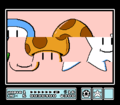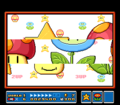Spade Panel: Difference between revisions
No edit summary |
m (Text replacement - "(\[\[Category:[^\]\|\n]+) Series Minigames(\]|\|)" to "$1 series minigames$2") |
||
| Line 55: | Line 55: | ||
[[Category:Super Mario Bros. 3]] | [[Category:Super Mario Bros. 3]] | ||
[[Category:Super Mario Advance 4: Super Mario Bros. 3]] | [[Category:Super Mario Advance 4: Super Mario Bros. 3]] | ||
[[Category:Super Mario | [[Category:Super Mario series minigames]] | ||
Revision as of 13:56, September 2, 2021
Template:Item-infobox Spade Panels[1], also known as Flip Games[2] or Spade Houses[3], are small panels on overworld maps in Super Mario Bros. 3 which can be used to earn extra lives for Mario or Luigi. Once they enter one, the player can play a minigame similar to a slot machine, in which parts of pictures slide past on panels and the player must line up three of the same panels to make a picture and win extra 1-Ups. There are Mushroom, Flower, and Star icons, granting 2, 3, and 5 extra lives when lined up, respectively, similar to the goal at the end of each level. If any of the panels are mismatched, no extra lives are awarded.
In the Game Boy Advance version (Super Mario Advance 4: Super Mario Bros. 3), if a Spade Panel is matched up correctly, further Spade Panels will change to Heart Panels. The Stars are replaced by Leaf icons that give 7 extra lives. Clearing one of these turns further Heart Panels into Club Panels, and the Super Leaves change to "3" icons that reward 10 extra lives. Clearing a Club Panel turns further panels into Diamond Panels, where only one picture can be lined up, making it impossible to lose. Earning a minimal amount of lives at previous panels will result in a mushroom picture, while higher amounts yield a random picture, and gives the corresponding amount of extra lives. If Mario or Luigi clears a Diamond Panel, or fails at any of the other ones, then all Panels will revert to Spade Panels, restarting the process.
A special Spade Panel, the N-Mark Spade Panel, appears every 80,000 points. When activated, Mario or Luigi will play a card game for prizes, with a total of nine prizes per game. After the game, all prizes earned will be included in the player's inventory. Unlike the other spade panel games, a player can make two mistakes during an N-Mark Spade Panel game before getting kicked out; when the next 80,000 points are achieved, they can continue the game from where they left off.
In Super Mario Maker 2, while the Spade Panel itself does not appear, its minigame reappears as part of the version 3.0.0 update in one of the Toad Houses the player can place on the world map in World Maker. They are distinguished by the Super Star on the Toad House's roof.
Gallery
Super Mario Bros. 3
Super Mario All-Stars
Super Mario Advance 4: Super Mario Bros. 3
Names in other languages
| Language | Name | Meaning | Notes |
|---|---|---|---|
| Japanese | スペードパネル[4] Supēdo Paneru |
Spade Panel |
Trivia
- This minigame's theme music is arranged in Super Mario RPG: Legend of the Seven Stars (for Grate Guy's Casino), Super Mario 64 DS and New Super Mario Bros. (for the Wanted!, Connect the Characters, and Mario's Slides minigames), Paper Mario: Sticker Star and Color Splash (for Snifit or Whiffit), Mario Party: Island Tour (for the mini-game theme "Slowly Bubble Up"), and Super Mario Odyssey (for the slots minigame).
- This minigame's theme music in Super Mario Bros. 3 is a looped sample from the bass-line (or pause music) from Super Mario Bros. 2's ground theme.







